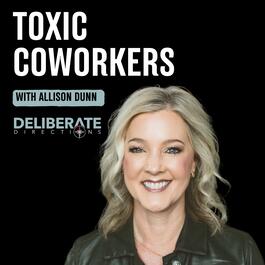
This episode of the Deliberate Leaders Podcast, hosted by Allison Dunn, addresses the significant challenge of dealing with toxic coworkers and their negative impact on productivity and energy levels. Dunn begins by highlighting that this is a widespread issue, noting that over half of their poll respondents had experienced it. She emphasizes that toxic colleagues are more than just annoying; they can drastically reduce team performance, citing Harvard research that suggests a decrease of up to 40%. This is framed as a serious business problem rather than a simple personality clash. The main focus of the episode is to provide five actionable strategies for leaders and individuals to protect their energy while navigating interactions with toxic coworkers, without damaging relationships or compromising their values. These strategies are discussed in detail: • Strategy number one: Recognize the pattern, not just the person. Dunn explains that toxic behavior often follows predictable patterns, such as constant complaining, credit stealing, gossiping, or sabotage. She advises listeners to document toxic interactions for a week, noting the triggers and the specific patterns observed, such as blame-shifting or information hoarding. She shares an example of a client, Melissa, who discovered that a difficult coworker undermined her only during morning meetings, revealing a pattern of feeling threatened when she presented first. Recognizing this pattern allowed Melissa to prepare accordingly. • Strategy two: Create conversational boundaries. Dunn points out that toxic behavior often thrives through conversation and reminds listeners that they control half of every interaction. She introduces a technique called "redirect and refocus," suggesting that when a toxic colleague starts complaining or gossiping, the listener should acknowledge their statement briefly and then immediately pivot to a work-related topic. She provides an example: responding with "That sounds challenging. Speaking of challenges, I could use your input on this project deadline". The goal is to gently but firmly steer conversations toward productivity, not to be rude. Dunn notes that after about three redirects, most "energy vampires" will likely seek easier targets. • Strategy three: Implement the oxygen mask principle. Drawing an analogy to flight safety instructions, Dunn stresses the importance of prioritizing one's own well-being when dealing with toxic coworkers. She recommends scheduling brief "renewal time" on your calendar after draining interactions, even just 15 minutes, to engage in activities like walking, deep breathing, or gratitude exercises. She shares an anecdote about a CEO who maintains a "sanity drawer" with items like dark chocolate, essential oils, and family photos for quick reset rituals. •. Strategy four: Document strategically. Dunn emphasizes that documentation serves not only for HR purposes but also as a daily tool for managing difficult dynamics. She advises listeners to follow up verbal conversations with email summaries that clearly outline discussed points and responsibilities, such as "As we discussed, you'll handle X while I focus on Y. Please let me know if I've misunderstood anything". This practice promotes accountability, offers the benefit of the doubt, and creates a paper trail to prevent gaslighting and confusion. •. Strategy five: Practice intentional disengagement. Dunn states that sometimes the most effective response is no response. She advises listeners to evaluate whether engaging with toxic behavior aligns with their goals. If not, she recommends using polite but brief responses that do not escalate conflict or encourage further engagement, which she terms "pleasant neutrality". She shares a client's description of this as "being Teflon—letting it slide off without sticking". Dunn clarifies that this is a strategy for energy conservation, not avoidance. In conclusion, Dunn reiterates that while you cannot control toxic colleagues, you can control the energy you give them. She asserts that successful leaders have mastered the art of protecting their energy while remaining effective, not necessarily having fewer difficult people in their lives. She also briefly mentions an opportunity to book a "Deliberate Direction strategy session" for personalized guidance on managing challenging workplace situations and protecting energy. She encourages listeners to visit Deliberate Directions dot com to claim a spot and reminds them that their energy is valuable. Finally, she thanks the listeners, encourages them to share the episode, and reminds them to subscribe to the podcast. About the Host: Allison Dunn • Host of the Deliberate Leaders Podcast • Business Coach • Founder of Deliberate Directions Connect: • Website: Deliberate Directions • Podcast: Deliberate Leaders Podcast Reminder: Subscribe and leave a review to support the podcast!
From "Deliberate Leaders Podcast with Allison Dunn"


Comments
Add comment Feedback